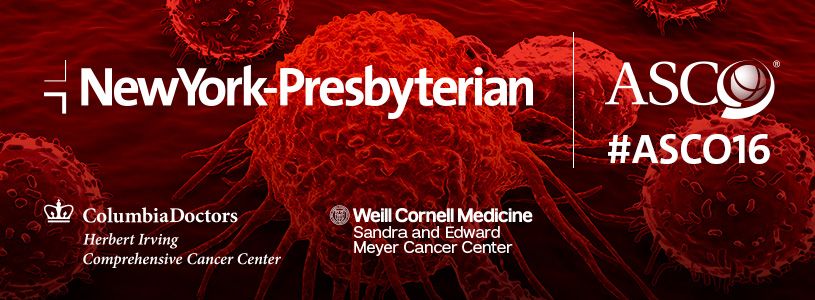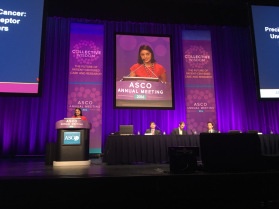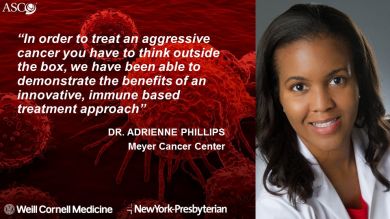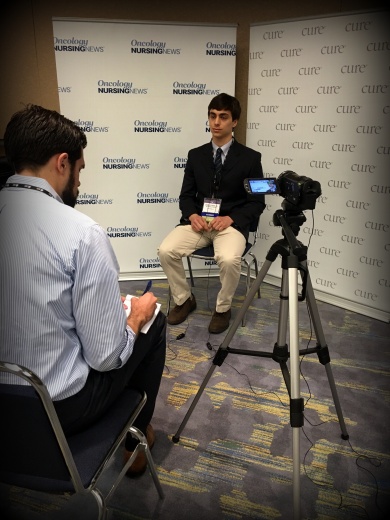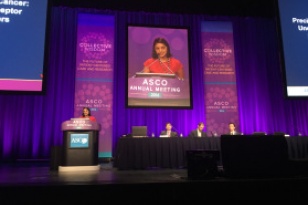Sharing our collective wisdom at ASCO16
Dozens of doctors, researchers and other clinicians from Weill Cornell Medicine and NewYork-Presbyterian descended upon Chicago from June 2-7 for the Annual Meeting of the American Society of Clinical Oncology, one of the largest and most important cancer conferences. Here are some of the highlights.
EXPERT OPINION:
- Hem/Onc Chief David Nanus, M.D., was consulted by several leading publications for his insights into breaking news from the floor of ASCO. He spoke to Reuters about a new immunotherapy drug to treat bladder cancer patients – especially good news for older patients or those with impaired kidney function who cannot tolerate cisplatin, the standard chemotherapy treatment currently in use. "It's extremely exciting for that group of patients to see these durable remissions," he said. He also spoke to the Washington Post and HemOnc Today about a liquid biopsy study that created a buzz because it suggested a potentially cheaper and less invasive way of monitoring malignancies. Nanus also welcomed the potential of liquid biopsies to better track tumor evolution throughout the course of a patient’s illness and/or upon relapse. "To be able to draw that information from a blood test is a huge step forward," he told the Washington Post.
- Gail Roboz, M.D., appeared on several FOX affiliates to discuss ASCO highlights and advancements in immunotherapy and precision medicine for blood cancers.
- Allyson Ocean, M.D., weighed in on the results of a phase III trial of a drug combination that may extend survival of pancreatic cancer patients, in this guest perspective piece in HemOnc Today.
ON TARGET:
Scott Tagawa, M.D., shared his own results using blood tests to guide treatment in metastatic prostate cancer. Together with Evi Giannakakou, Ph.D., he developed a trial to test whether doctors could use the standard PSA blood test to predict which patients might not respond well to the standard first-line chemotherapy drug docetaxel, and to switch them to an alternative drug earlier in their treatment. By adopting this early switch therapy, the overall response rate to taxane chemotherapy was significantly higher than expected based upon prior studies, according to their findings.
Tagawa also presented about his use of monoclonal antibodies to deliver radioactive particles to prostate cancer tumors as a novel form of “radioimmunotherapy” treatment. See video below, and this What’s New in GU blog post to learn more.
TO BE PRECISE IN PROSTATE CANCER:
Himisha Beltran, M.D., led a major session intended to demystify some of the language and updates surrounding precision medicine. At “Precision Medicine in Advanced Prostate Cancer: Understanding Genomics, Androgen Receptor Splice Variants, and Imaging Biomarkers,” Beltran spoke about important recent advances in tumor and patient genomics, such as the specific genetic alterations that we now know drive different types of tumors and play a role in the development of aggressive forms of the disease. The session was featured in the ASCO Daily News Highlights. Read more here.
MUY HOPE FOR MOGA:
The results of a small, but impressively diverse clinical trial led by Adrienne Phillips, M.D., were met with great enthusiasm among patients and clinicians involved in leukemia and lymphoma. Phillips found that the antibody drug mogamulizumab, known as moga, induces tumor responses in nearly 28 percent of patients with relapsed or refractory adult T-cell leukemia-lymphoma (ATLL), a fast-growing and difficult to treat blood cancer that disproportionately affects minorities in the United States. Mogalizumab binds to CCR4 proteins on tumor cells, allowing the immune system to better target them. This may represent a breakthrough in treating ATLL, for which there are currently no drugs approved in the United States to specifically treat the disease. Read more here.
BRIGHTER OPTION FOR GASTRIC CANCER PATIENTS:
Manish Shah, M.D., reported on the status of his phase III trial currently underway to test the effectiveness of a new first-in-class stemness inhibitor drug, BBI-608. "BBI-608 blocks cancer stem cell self-renewal and survival by suppressing stemness pathways, including Stat3, a protein central to cancer progression. This protein hasn't been targeted well in the past, making BBI-608 a distinctive treatment option," he told Oncology Times. The results of the BRIGHTER trial have the potential to revolutionize treatment options for patients with advanced gastric and GEJ adenocarcinoma as well as a variety of other cancers, he added. Watch a video interview with Cancer Therapy Advisor here.
THE MESSENGER MATTERS:
Research at the Weill Cornell Center for Research on End-of-Life Care has shown that what is said during end-of-life discussions is important – so much so, that Medicaire recently started reimbursing clinicians for engaging in such talks. Who delivers the message also matters, according to findings presented at ASCO. Advanced cancer patients who discussed their re-staging scan results with an oncologist versus an oncology fellow or nurse practitioner were three times more likely to recognize that their disease was late- or end-stage, according to research assistant Simon Mentis Cohen. Read more here.
MEASURING MYELOMA:
Pathologist Scott Ely, M.D., reported on the "SynKii" assay, a validated instrument he developed to determine the proliferation rate of myeloma cells in a patient biopsy. Along with Ruben Niesvizky, M.D., and Tomer Mark, M.D., Ely has performed three studies, showing that myeloma cell growth, as assessed by SynKii, accurately predicts overall survival and progression-free disease. The team also compared three methods for risk assessment and the cost associated with each one, bringing into question the cost-effectiveness of genetic analysis for myeloma.



